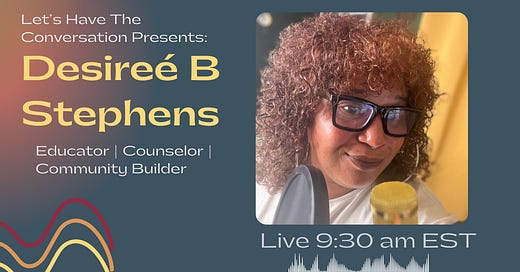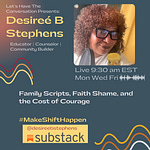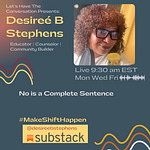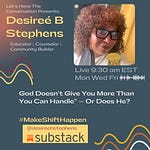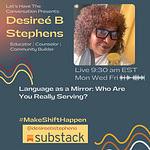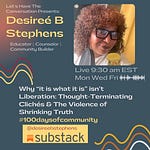First, Let’s Celebrate
Eighty-three days. Let that sink in.
Whether you’ve been here every day or today is your first one, you are a part of this living, breathing, liberatory practice. That is no small thing. This work isn’t about perfection—it’s about presence. You showed up. And that matters.
This morning’s live wasn’t tidy. It wasn’t scripted. It was real. It was layered. It held hard truths and radical honesty. It was full of your questions, your comments, your fears, and your fierce commitments.
So today’s article reflects that. It’s less polish, more praxis. Less metaphor, more moment. We’re going to sit in the truth of where we are, what we’ve learned, and where we go from here.
🎧 Featured Clip Timestamp
"Reflection is where we meet ourselves, not to criticize—but to recognize."
In this clip, we unpack the sacred act of reflecting—not as a way to shame ourselves for what we didn’t know, but to anchor into what we’ve learned and what we’re now responsible for. I shared about using language that caused harm before I had the knowledge I do now, and how reflection allowed me to take accountability without collapsing into guilt.
It’s not about perfection. It’s about expansion.
And that’s the essence of liberatory reflection—it invites us to see clearly without flinching, so we can grow more rooted in our values and more aligned in our actions.
What We’re Learning Today
Reflection Deepens Understanding
It pulls us out of reaction and into truth. It slows the scroll. It disrupts consumption. It reminds us what it means to be human in an overstimulated world.Reflection Creates Accountability
When we reflect honestly, we create room to own what we didn’t know, repair where we missed the mark, and move forward with deeper clarity.Collective Reflection Strengthens Movements
When we reflect together, we weave our experiences into wisdom. We build power that’s shared, not hoarded. We don’t just survive the work—we sustain it.
Sitting With the Hard Truths
Let’s be honest—today wasn’t just a lesson. It was a reckoning.
This wasn’t about easy answers or comfortable conversation. It was about sitting with contradictions, discomfort, and collective accountability. And that’s exactly what reflection requires.
We named that the suffragette movement was both brave and bigoted.
Yes, they were courageous. Yes, they pushed systems. And yes—they upheld whiteness, anti-Blackness, and exclusion.
“They were badass racists,”
“Get some more suffragette energy—and lose the racism.”
That truth matters. Because if we’re not careful, we replicate it. We fight for freedom without examining for whom. We scream about equity while clinging to supremacy culture in our strategies, our silences, our organizing.
Reflection is what stops that.
It’s the pause that keeps us from reacting through ego.
It’s the check-in that reminds us we are not exempt from harm.
It’s the space where we stop worshiping strategy—and start choosing integrity.
“What does it look like to reflect on a protest that didn’t feel inclusive?”
“What happens when white leadership bans arms without considering the lived reality of state-sanctioned violence?”
That’s not just a call-out. That’s a collective debrief.
Because when we don’t debrief, we bleed. We burn out. We build brittle movements that collapse under the weight of their own unprocessed harm.
And that leads us to the other truth you named boldly:
We need to stop romanticizing nonviolence.
Black liberation has always included armed protection. Gun control in this country has always been racialized. We cannot claim solidarity while policing the methods of survival for those most targeted.
“You can’t disarm people while arming the state,”
“That’s how we got here in the first place.”
And to the tired ones.
To those burned out by the cycle.
To those watching fascism rise while rest feels like a betrayal.
To those who want to fight but can’t find the energy anymore.
I’m not going to say “keep pushing.” Instead:
“Find joy. Medicate. Walk outside. Drink tea. Rest. Because there will always be more work. And we are in this for the long haul.”
That’s not giving up. That’s strategic. That’s sustainable. That’s the only way forward.
The Hardest Truth? Trump Isn’t the Exception—He’s the Blueprint
One of the most sobering things we named today is that Trump isn’t an anomaly. He’s an embodiment.
He’s not a disruption to the system. He is the system—unfiltered, unpolished, unmasked.
“Trump is your cousin. Your uncle. Your coach. Your neighbor. Your pastor.”
“He’s the everyday white guy who just finally said the quiet parts out loud.”
He didn’t break America. He revealed it.
And for a lot of people, that revelation felt like home.
Not because they’re inherently hateful—but because they’ve been fed a diet of supremacy, scarcity, and scapegoating for generations.
So when we talk about reflecting on harm, we have to reflect on this too:
Who have we protected because they’re familiar?
Who have we excused because they’re “not that bad”?
Where have we avoided confrontation because it felt too close to home?
If Trump is familiar to you—it’s because the systems that formed him have also shaped your family, your school, your work, your community.
That doesn’t make you complicit forever.
But it does make you responsible now.
And that’s why reflection is so powerful.
Because it gives us back our sight—so we can choose something else.
Want to See How to Put These 3 Reflections Into Practice?
Behind the paywall, we shift from reflection into application.
We’re talking real life. Real roles. Real resistance.
We unpack:
What self-accountability actually looks like when you’re unlearning harm
How to facilitate collective debriefs in movement spaces (without reactivating trauma)
What it means to make room for armed protection in liberation movements while holding safety and strategy
How to reimagine your role in community if you’re tired, grieving, or carrying too much
This isn’t theory. It’s the behind-the-scenes of movement-building. The stuff we don’t post on social. The conversations we need to have if we’re serious about sustaining this work.
You don’t have to do it all.
You just have to keep doing it with intention.

